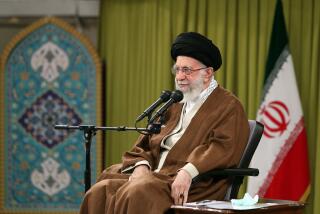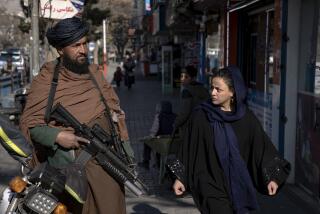Afghanistan judge sentences 4 to death in mob killing of woman

A defendant speaks during his trial in Kabul, Afghanistan, on May 3.
Reporting from KABUL, Afghanistan — An Afghan court Wednesday sentenced four men to death in the mob killing of a woman who was falsely accused of burning the Koran, an episode that prompted outrage in Afghanistan and around the world.
Eight other defendents were sentenced to 16 years each while 18 had charges against them dropped due to lack of evidence.
Afghan security officials said they were still searching for three suspects in the March 19 lynching of 27-year-old Farkhunda at a riverside shrine in the Afghan capital. One of the suspects was said to be in hiding in the northern province of Panjshir.
The victim’s family expressed anger at the verdict, saying that many other perpetrators were still at large.
“This is not a trial,” Najibullah, Farkhunda’s brother, said in an interview. “We do not accept that out of thousands who either helped or stood back and watched, only four will be hanged.”
The family of Farkhunda, who like many Afghans has only one name, said they did not have the opportunity to testify during the four-day trial. They were not comforted by the prison sentences handed down to the eight defendants, arguing that they should suffer the same fate Farkhunda did.
“Those that beat her should be beat, those who burned her burned,” Najibullah said. “Those who threw rocks and sticks at her should be beaten with rocks and sticks.”
Amateur video captured on cellphones showed hundreds of people, mostly young men, looking on as Farkhunda was beaten, run over by a car and eventually burned to death in a dry patch of the Kabul River. Police did little to stop the brutal killing, although authorities later established that Farkhunda had not burned pages of the Koran as she was initially accused of doing.
The incident became a rallying point for women’s activists both in the country and abroad, and galvanized protests in multiple Afghan cities. Female demonstrators said the case heightened their fears that they could face a similar fate as Farkhunda’s for almost any reason.
Her family initially said Farkhunda had been suffering from mental illness, but later retracted that claim, saying police officials told them that explanation could protect them from reprisals. Subsequent investigations found that she had not burned the Koran, and that charred pages found at the scene did not belong to Islam’s holy text.
Each of the convicted has the right to appeal. They were found guilty of charges including assault, murder and incitement.
The four sentenced to death are named Zainuddin, Mohammad Yasin, Mohammad Sharaf and Abdul Bashir.
A verdict is expected early next week for 19 remaining suspects, all police officers, who are charged with neglecting their duties.
Najibullah said his family hopes that Afghans will protest the verdict as too lenient.
“From the very beginning our family always said, ‘Farkhunda is not just our daughter. She is all of your daughters,’” he said. “Now is the time for the people to stand up again and say they too do not accept this verdict, because tomorrow any of their daughters and sisters could be the next Farkhunda killed for no reason.”
Latifi is a special correspondent.
More to Read
Sign up for Essential California
The most important California stories and recommendations in your inbox every morning.
You may occasionally receive promotional content from the Los Angeles Times.










